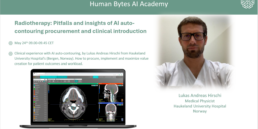Discover how TheraPanacea is using AI to healthcare through the eyes of our CEO!
“My goal is to push the limits of radiotherapy with artificial intelligence and to give every patient the best treatment possible!”
What made you want to be involved in the intersection of radiotherapy and artificial intelligence (AI)?
Cancer today is the third cause of mortality worldwide and by 2030 we expect 1 out of 2 people to be diagnosed with cancer at some point in their life. Radiotherapy is the most effective used treatment in cancer care. Today we are lacking tools to enable standardization, automation, and improved outcome for radiotherapy patients.
AI can really make a difference by learning from treatment plans from people that have undergone radiotherapy to produce the best possible treatment options for future patients.
The reason why I decided to go in this domain is because it is extremely interdisciplinary – we need expertise in computer science, mathematics, physics – whilst at the same time being a domain where we can really have a great societal impact.
What does “TheraPanacea” mean and where did you get the idea for the name?
It is a combination of two ancient Greek words: Therapeía (therapy) and Panakeía, daughter of Asclepius, who was the father of modern medicine. Panakeía was the universal remedy for all diseases.
I think the name is very fitting, as what we are trying to do is to offer solutions that can cure patients, independently of the type of cancer they have.
How does TheraPanacea make the difference?
We want to change the way of doing things. We are not only there to improve the way we treat patients but also to develop solutions that will make a difference.
For example, we are already working on many multi-centric projects and products that will lead to new clinical trials and eventually make a difference for patients.
Our people with over 15 nationalities make the difference because we all share the same ambition of using science and technology to have a life long lasting impact on the society, and to offer the best possible treatment to people who would not normally have access to it.
This unique collaboration of a mission driven company, its people and our partners and collaborators, enables us to push the limits of how we treat and address cancer patients today.
Can you tell us about any exciting projects you are working on?
In a multi-centric clinical trial, we are developing AI algorithms to elucidate the complex structure of GBM and unlock underlying local characteristics which are invisible to human eyes. This unique collaboration with outstanding clinical partners will shift radiation oncology towards a personalized, smart treatment delivery with better outcomes, lower treatment toxicity and substantial side-effects reduction for GBM patients.
In a second, equally ambitious project, we are looking into a novel way to combine radiotherapy with immunotherapy. Today, radiotherapy kills cancer cells whilst sacrificing blood lymphocytes which, in turn, are necessary for immunotherapy. What we are working on is to find a way of effectively combining these two therapies for H&N tumors.
The last example I can give you is a project where we are using AI to predict or choose the patients that are the most likely to be strong responders to immunotherapy for lung cancer. This is not only important to increase the probability of patients responding to treatments, but also to enable radiation oncologists to more rapidly change a treatment plan for non-responders. Especially for one of the highest mortality rate cancer types, saving time can be crucial and decivise for the outcome of the treatment.
What is the role of AI in radiotherapy in10 years?
AI will have multiple ways of changing the way we are treating cancer patients today. The first one, which is already happening now, is standardization. Software solutions, especially when done properly, can offer to any center the same capacity of treating patients as flagship centers. Thanks to AI-based solutions, clinical staff will be able to propagate good practices everywhere. And that’s already the case of our first product, Annotate, which offers guideline-based auto segmentation of organs-at-risk and lymph nodes.
The second impact of AI in radiotherapy is the increase of patient throughput. Today, patients have to wait to start with their treatment. The reason why they have to wait is because, despite the little time spent under the machine, there is a lot of time that goes towards preparatory, often time-consuming and tedious steps. AI can be a great ally here to help reduce the diagnosis to treatment time. This is essential for cancer treatment: the sooner we treat, the better response we can potentially have.
The ultimate impact of AI is to improve outcomes. Today, it is hard for humans to understand what is the relationship between the treatment plan and the outcome. But if we are able to leverage all the data available in the radiotherapy domain, and we use AI to connect these dots, we will finally be able to determine what is the best treatment pathway for every patient. In summary: standardization, improved efficiency of the healthcare system by treating more patients faster with the same infrastructure, and improved outcome with better response and reduced long-life side effects.
Where do you see TheraPanacea in 10 years from now?
Today. one of the main issues we encounter to get solutions and be well-equipped is not related to budget. It is mainly due to the lack of experts and health-care professionals specialized in certain areas. Standardization and software is the perfect combination to overcome that.
My ambition is that TheraPanacea will be treating patients from all over the world and contributing to guaranteeing that every patient gets the best possible treatment thanks to AI-powered solutions.
LEARN MORE ABOUT HOW OUR TOOLS ARE ALREADY REINVENTEND RADIOTHERAPY THROUGH AI!
Related Posts
25 June 2024
Unlocking the Potential of AI Auto-Contouring in Radiotherapy at HELSE Bergen [WEBINAR]
Clinically Relevant AI in Radiation…
24 October 2023
Innovations in Radiation Oncology: Harnessing AI for better patients outcomes [WEBINAR]
Clinically Relevant AI in Radiation…




